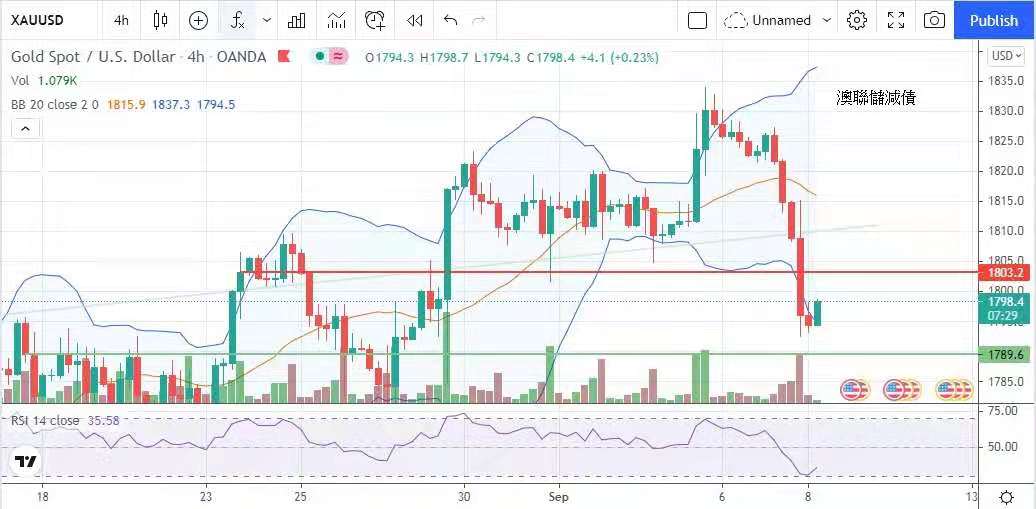model
On September 8th.
Today's volatility range:
The Reserve Bank of Australia announced that it would keep the central bank's interest rate unchanged, but began to reduce the scale of bond purchase, and investors took it as a sample, confirming that although the mutant virus still threatens the pace of global economic recovery, the Fed is controlling liquidity.
In order to reduce inflation, I am afraid that raising interest rates will hit corporate profits, hurt the job market and hinder economic recovery. Even if the non-agricultural data this time are not satisfactory, it will only slow down the pace of debt reduction, but will not hinder it.
The decision of the federal reserve to bolt the water hose. Yesterday's gold price adjustment has already reflected that the Fed's table reduction is imminent, and the subsequent development depends on the Fed's buying reduction. The relative strength index of the gold market fell to the edge of 30, and it is expected to still fluctuate today.
Suggested amplitude is between 1790-1802 USD.
Yesterday, the mainland released the import and export data for August, both of which were better than market expectations, with year-on-year growth of 33.1% and 25.6% respectively, and the expanded trade surplus reached 58.34 billion US dollars in the same period. Digital import growth shows that China's domestic demand has recovered.
Returning to a stable epidemic situation is conducive to the rise of consumption in the Mainland and breaks the market's expectation that China will continue to be weak. The export growth of economic commentators is due to the fact that the manufacturing industry in Asia-Pacific countries is dragged down by the epidemic, and buyers are worried about delivery.
The date may be postponed and some orders will be transferred to China, which is also beneficial to the upward development of China's economy. It is expected that this momentum will be extended to the golden period of Christmas. The mainland stock market is doing well because of the ideal performance of import and export.
Hong Kong stocks rose further, and Beishui recorded a net inflow for two consecutive days. The Hang Seng Index moved from low to high yesterday, rising 190 points or 0.73% throughout the day.
Britain announced plans to raise taxes and increase the national insurance tax and dividend tax. British Prime Minister Johnson said that this tax increase will bring revenue to the British Treasury and raise funds for medical and social security reform. British business organizations.
Criticize the tax increase despite the epidemic, which will increase the operating cost of enterprises. The UK stock market immediately fell from a three-month high, with the FTSE 100 index gaining 0.53%. At Munich Auto Show, Germany, major automakers continued to issue warnings about chip shortage.
It is predicted that the shortage problem will continue, which will affect the production volume and push up the production cost, and the automobile price will also rise. The increase in car prices and the economic environment are still subject to Covid-19, which is unfavorable to German car companies, and the German DAX index fell.
0.56%; Paris CAC index fell 0.26%. Yesterday, the US stock market reopened after Labor Day holiday, and the three major stock markets on Wall Street developed individually. The disappointing US non-agricultural data fermented on Friday, and the Dow Jones index rose first and then fell.
It closed down 0.76%, the S&P 500 index fell 0.34%, and the Nasdaq index once again broke the record high and rose 0.07%.
The Reserve Bank of Australia announced the interest rate decision yesterday, keeping the benchmark interest rate unchanged at 0.1%, in line with market expectations. The Australian Federal Reserve said that the uncertainty caused by the outbreak of the COVID-19 variant virus strain is not conducive to the sustainability of economic recovery.
At present, the pressure on wages and prices is still low, and it is expected that they will return to the pre-epidemic level in the second half of next year. It is expected that the conditions for raising interest rates will not appear until 2024 at the earliest. The Reserve Bank of Australia will strive to maintain a high economic profile.
In a supportive monetary environment, it was announced that the bond purchase scale would be reduced from A $5 billion per week to A $4 billion per week, and it would last at least until February next year. The gold market opened at a maximum of $1,827 yesterday, but then fell unilaterally.
Although the central bank's interest rate remained unchanged, it began to reduce the scale of debt purchase. Investors made forward-looking reference and expected the Federal Reserve to reduce its debt purchase before the end of this year. The gold market fell repeatedly, and after falling below $1,808, the decline became more urgent.
The lowest price was $1792, and finally closed at $1794, down $29.
For detailed analysis and operational suggestions, please CLICK the following link to join the group and check with the administrator.
https://t.me/mingtakchat
Previous Article Next Article


 Whatsapp
Whatsapp Telegram
Telegram
